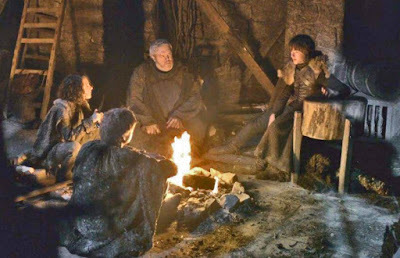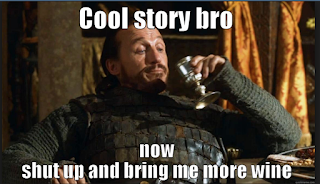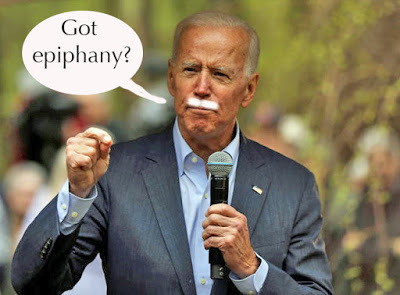Dan Riley's Blog, page 10
July 11, 2019
Nazis on my Mind
It all started about two weeks ago when we went off to see our local theater group’s (excellent) production of The Producers , Mel Brooks’s high-wire musical comedy about Hitler. The fig leaf of satire barely covers its brazen political incorrectness…and not just for milking the Holocaust for laughs, but for Brooks’s hoary brand of vaudevillian sexism, which seems to march unnoticed under Nazi banners. (Just a few years ago in this same venue I heard a broad chorus of hissing when Henry Higgins sang, “Why Can’t a Woman be More Like a Man?” in My Fair Lady.)
Shortly after we left the theater cheerily humming "Springtime for Hitler", the world’s most famous freshman member of Congress, Alexandria Ocasio-Cortez called the US holding facilities for refugees, asylum seekers and ordinary immigrants at our southern border "concentration camps". There was a fury of reaction against her for the comment (from the most unlikely and discredited of sources) claiming that she had demeaned the memory of the victims of actual concentration camp. It was such a furor that Michael Godwin, the man who put forth Godwin’s “law” out of fear that casual Nazi analogies could trivialize actual Nazi atrocities, broke his own law and chimed in with agreement that, Yeah, they’re concentration camps.
Godwin put forth his “law” in the 1990s, contending that the longer an internet thread went on the more likely it was that someone would mention Hitler or Nazis. I have no idea whether drawing attention to this phenomenon had any material effect in tamping down Nazi analogies in public discourse. My own unscientific observation is that you can hardly find a Nazi mention in online “discussions” nowadays that is not immediately followed by a reference to Godwin’s law. So here’s to Godwin for at least making a meme for himself.
The Third Reich went goose-stepping through my imagination again when I came across this stunning picture of US women’s soccer star Megan Rapinoe:
 Eat your hard, cold hearts out, neo-Nazis.
Eat your hard, cold hearts out, neo-Nazis. Although the image itself would’ve fit perfectly on a 1930’s German poster promoting Aryan superiority, it is now in fact the vibrant image of American anti-fascism. And it is mostly a reminder of how Jesse Owens, another target of authoritarian bullying, used the sports arena to kick another thuggish ruler in his tiny glass balls. Today Aryan superiority looks more like this:
 Anyway, one has to be careful with Nazi analogies. Did the tanks summoned to our little führer’s 4th of July vanity parade in his own honor roll on into Canada for Lebensraum? No. Do the detention centers where we’re holding some of the most desperate and frightened people on earth include ovens for eventual human extermination? No. Has the US Congress, like the German Reichstag in 1933, passed an Enabling Act, granting the leader virtual dictatorial powers? No. (Well, not yet anyway, but we’ll have to check back on this in a week or so.)
Anyway, one has to be careful with Nazi analogies. Did the tanks summoned to our little führer’s 4th of July vanity parade in his own honor roll on into Canada for Lebensraum? No. Do the detention centers where we’re holding some of the most desperate and frightened people on earth include ovens for eventual human extermination? No. Has the US Congress, like the German Reichstag in 1933, passed an Enabling Act, granting the leader virtual dictatorial powers? No. (Well, not yet anyway, but we’ll have to check back on this in a week or so.)Yet there’s one Nazi era analogy that I still think serves a useful, inarguable purpose, and that is the “Good German”. The Good German may be one of the most ironically loaded expressions to come out of the 20th century. History tells us that Good Germans were those citizens of the Third Reich who essentially turned a blind eye to all the bad the Nazis were committing in their name. They weren’t direct participants in the deplorable acts...nor were they those who "merely" tipped off Gestapo agents about perceived suspicious behavior in their apartment buildings or neighborhood. They were just people who went about their daily business as if nothing out of the ordinary was happening…either out of a desire to ignore it or abject fear that in recognizing it they were morally obliged to do something about it.
As explosive as the concentration camp analogy may be, the Good German analogy is more resonant. It was Good Germans, after all, who made Hitler’s concentration camps (and ovens!) possible. The “Good Americans” who walk among us in blissful/willful ignorance make the wretched conditions at our border possible. They turn away when the media covers it because they find it too unpleasant. They shut down conversations about it when they arise because they don’t like talking about “politics”. They persuade themselves that the problem is too big and complex for them to deal with and so they leave it to the authorities. That’s how Good Americans arrive at a place where they can allow awful things to happen in their name without a pang of moral pain.
What’s to be done? In some ways, escape from history’s harsh judgment on all of us here witnessing this dark time is relatively easy: just do the simple things the Good Germans failed to do: pay active attention, talk to our neighbors, call our congressional representatives, write letters to our local newspapers, take a stand for conscience on social media no matter how much our online friends may want us to keep it light and carefree.
Will that be enough to save us all from the shame of going down in history as “Good Americans”? Hard to tell. We’re are all compromised to one degree or another. It’s an inescapable fact of American life. If you pay taxes, you’re paying the salary of Stephen Miller, the architect of our disgusting border policy of deterrence through separation of families and caging children. We’re paying the salaries of the border patrol agents who go on secret Facebook pages to demean and demonize the people suffering daily in their charge. The increased entanglement of our politics and commerce makes it almost impossible to make a simple purchase of a hammer and nails without becoming complicit in the damnable policies emanating from the top.
In the end, however, think we’re better off leaving Nazis to the mockery of the likes of Mel Brooks. It took the combined forces of the world’s armies to stop Hitler. We imbue our mentally unstable, baffoonish head of state with a power and capacity for global chaos that he does not merit. The rhetorical payoff of Nazi analogies is dubious…and ultimately self-defeating. If we surrender to the cynicism, the frustration, the civic emasculation of the current climate, we are no better than the Good Germans…but without their excuses. There is no Gestapo knocking on our doors at night to take us away for an act of political protest. We still have the right and obligation to be good Americans…without the ironic quotes. Every moment arguing—not studying—the past is a moment not spent fighting for the future.
Published on July 11, 2019 13:34
July 2, 2019
The Farce of July
Published on July 02, 2019 13:19
June 26, 2019
The Courage of His Charisma

During the historic and critical 2018 mid-term elections, I really only had one eye on Beto O’Rourke’s attempt to become the first Democrat in Texas since like the invention of chewing tobacco to win a statewide race. For me his campaign against the truly odious Ted Cruz was a distant “nice to have” on an evening when most of my (ahem) thoughts and prayers were focused on the Democratic attempt to take back the House of Representatives, starting with my own vile "representative", Duncan Hunter, who could go toe-to-toe any day of the week with Cruz in a showdown of Deplorables. I caught enough of Beto’s time in the spotlight to understand where the excitement around him was coming from…most notably from his forthright, clarion clear stand with the NFL players taking a knee during the National Anthem to protest the epidemic of police killings of unarmed black men. Although the viral video of him making that statement may have hurt him at home in Texas by arming Cruz with a demagogic blunt instrument to attack him with, it raised Beto’s national profile sufficiently to help him raise record millions for his senate race and name recognition for a subsequent presidential race. Beto is not my first choice for the Democratic presidential nomination, maybe not even my second or third. But I’m glad he’s in the race and glad he’ll be on the debate stage…and hopeful that his role in the campaign to eradicate Trumpism will be significant. This, as has already become apparent, will not be easy. Since entering the presidential race, Beto has been under attack on two fronts. First from the media that, true to its tradition, believes that anyone it builds up, it can take down…and rather relishes doing both. Second, from the leftwing of the Democratic Party which sees Beto as too cozy with the energy industry and too lightweight when it comes to policy specifics. The overall attempt is to portray O’Rourke as a one-hit wonder--who, despite doing surprisingly well in Texas, still managed to lose to one of the most repugnant politicians in America. The combined effort has succeeded in keeping Beto down in the polls and taken some of the shine off his once rising star. Like many Democratic voters, I have largely taken a show me what you can do stance in this primary campaign…I’m all in on the risers, wary of the sinkers…and downright afraid of front runners with a track record for losing. But I recently found myself killing about 90 idle minutes in front of the HBO documentary Running with Beto, about O’Rourke’s losing campaign against Cruz and found it to be a welcome, revelatory reintroduction to the man. Aside from his oft-mentioned personal charisma, what comes across most in the documentary is his moral and physical courage. At one point he’s on the Texas-Mexican border, ground zero of the immigration crisis, calling out the “invading caravan” for the Trump/Fox News manufactured bullshit that it is while at the same time comforting the families of the separated and incarcerated. At another point he’s meeting with the mothers of black kids abused by police where he shares a story of his DUI arrest and own encounter with police to demonstrate first hand understanding of how blacks and whites are treated differently by law enforcement. He takes up common cause with the student survivors of the Santa Fe Texas school shooting that left 10 dead, vowing any help they want from him in defeating the gun lobby. That stance earns him and his family an attempted intimidation visit from two heavily armed, open-carry militants at one his campaign rallies. Later his wife has to explain to their kids why men with guns are mad at their father. Even in a lighter, seemingly trivial moment, O’Rourke shines with particular luster. At a campaign event a prospective voter (or Republican troll) asks him how his early career as a punk rock musician qualifies him for the US Senate. There’s no sheepish smile of demur…no alibi about being so much younger then. Instead he smoothly responds that punk was a revolt against corporate control of the music industry just as his campaign is a revolt against corporate control of politics. When his stock was rising in 2018, it was common, especially among the media, to favorably compare his charismatic appeal to John F. Kennedy’s or Barack Obama’s. After watching this documentary, I’ve concluded that those comparisons are unfair…to Beto. Both JFK and Obama mostly exercised their charisma rhetorically from the stage or telegenically. O’Rourke took his charisma into one of the most openly hostile political environments imaginable and used it fully to press important points on highly emotional issues—patriotism, race, immigration, gun rights. He never flinches throughout and always maintains a sense of decency and reasonableness in advancing the causes he believes in. In the end he lost, but what he did to energize Democratic voters in Texas was truly remarkable. Because of his dedicated grass roots effort that took him to every one of Texas’s 254 congressional districts, Democratic turnout was the highest it’d been in quarter of a century. In a personally losing cause, he managed to inspire and engineer a stunning reversal of fortunes for Texas Democrats:
On Tuesday night, Cruz beat O’Rourke by just over two points. Back in 2012, Cruz beat his Democratic challenger by nearly 16 points. O’Rourke didn’t just close the gap. He didn’t just energize voters. He created an infrastructure of over 25,000 volunteers, many of them in places where there had been no formal Democratic presence for decades. Voter turnout in Texas reached 52.8% — surpassing the 2016 presidential election (51.6%) and blowing away turnout from the last midterm election (28.5%). In early voting, turnout among young people was estimated to be up a stunning five-hundred percent.
It’s infuriating to watch this very gifted politician be treated like yesterday’s news by the media and held to overbearing litmus tests by the purity wing of the Democratic Party. He seems to be going about his national quest for office much the way he went about his state run…organizing at the grass roots, building on social media, meeting face to face and carefully listening to voters…and would-be voters. That nuts and bolts, behind the scenes work will undergird his first national debate appearance this week. I have little doubt that he’ll be one of the few who will shine in the sea of Democratic contenders, and that will probably be reflected by a boost in his polling numbers. It may in the end not be enough to lift him to the Presidential nomination, but it should set him up nicely as Elizabeth Warren’s ideal running mate…or John Cornyn’s replacement in the Senate (if he pulls out of the presidential race in time to make the challenge). In either case…his demonstrated moral and physical courage on the campaign trail is as important as any policy paper, and the future seems bright for Betomania if not this year, soon enough.
Published on June 26, 2019 09:45
June 21, 2019
Caution: Agenda Dead Ahead
 Amy Adams is producing The Poisonwood Bible for HBOI’m guessing I’m not the only one who has had this experience: You finish a book, put it down and think, If only everyone would read this book, it would be such a much better world!There have a been a few books in my life that have impressed me like that…most recently and most powerfully Barbara Kingsolver’s 1998 Pulitzer Prize finalist, The Poisonwood Bible. Note the date. This magnificent, potentially world-altering novel has been around for more than 20 years, and I just got around to it…and only because my sister-in-law Lorraine recommended to my wife, and Lorna and I have gotten into the routine of swapping iPhones on our bike rides to listen to each other’s Audible books. Talk about serendipity.Briefly, for others like me unfamiliar with it, the book is alternately told from five different perspectives—a mother and her four daughters, all of whom were taken to the Congo in the late 1950s by the head of their family, Nathan Price, a zealous Christian missionary. Over decades in their respective narrations the women give testimony to their lives as strangers in a strange, forbidding land and under the thumb of their autocratic patriarch. Their stories are infused with keen-- though occasionally accidental--insights into clashes of culture, gender, morality, values, and egos. As the females gain their voices, their individual identities sharpen and become archetypal:Orleanna—the Mother, torn between her nurturing instincts and loyalty to her husband’s visionRachel—the embodiment of cynical, white Western privilegeAdah—the avatar of science and intellectLeah—the model of ideals and passionRuth May—the InnocentBy the end of the book, their voices--riffing off each other like a jazz combo--provide coruscating commentary on colonialism, racism, cultural imperialism, American foreign policy (pre-9/11), religious fanaticism, and family dysfunction. I found it both thoughtful from a philosophical standpoint and riveting from a fictional one. So imagine my shock when after finishing it the first review I encountered about it on Goodreads gave it two stars in a rather long review that ends with:
Amy Adams is producing The Poisonwood Bible for HBOI’m guessing I’m not the only one who has had this experience: You finish a book, put it down and think, If only everyone would read this book, it would be such a much better world!There have a been a few books in my life that have impressed me like that…most recently and most powerfully Barbara Kingsolver’s 1998 Pulitzer Prize finalist, The Poisonwood Bible. Note the date. This magnificent, potentially world-altering novel has been around for more than 20 years, and I just got around to it…and only because my sister-in-law Lorraine recommended to my wife, and Lorna and I have gotten into the routine of swapping iPhones on our bike rides to listen to each other’s Audible books. Talk about serendipity.Briefly, for others like me unfamiliar with it, the book is alternately told from five different perspectives—a mother and her four daughters, all of whom were taken to the Congo in the late 1950s by the head of their family, Nathan Price, a zealous Christian missionary. Over decades in their respective narrations the women give testimony to their lives as strangers in a strange, forbidding land and under the thumb of their autocratic patriarch. Their stories are infused with keen-- though occasionally accidental--insights into clashes of culture, gender, morality, values, and egos. As the females gain their voices, their individual identities sharpen and become archetypal:Orleanna—the Mother, torn between her nurturing instincts and loyalty to her husband’s visionRachel—the embodiment of cynical, white Western privilegeAdah—the avatar of science and intellectLeah—the model of ideals and passionRuth May—the InnocentBy the end of the book, their voices--riffing off each other like a jazz combo--provide coruscating commentary on colonialism, racism, cultural imperialism, American foreign policy (pre-9/11), religious fanaticism, and family dysfunction. I found it both thoughtful from a philosophical standpoint and riveting from a fictional one. So imagine my shock when after finishing it the first review I encountered about it on Goodreads gave it two stars in a rather long review that ends with:“While it might be a helpful work to those longing to know Africa or understand cross-cultural disconnects, I cannot give it more than two stars because of the blatant agenda referenced above.”In order to keep one’s sanity while circulating through the Internet, I think it’s always helpful to remember that the US has a population of 330 million people… that allows for a very broad spectrum of perspective and opinion (and of course because the Internet reaches beyond the US the potential for running into people who don’t see things the same as you can increase perhaps 10-fold). On the other hand, having so many opinions of dubious value readily available online saves one the time of inventing strawmen. If you want to take up arms against bad ideas, weak arguments, or sheer ignorance, the Internet abounds in easy targets. Although shooting fish in a barrel is not my usual cup of tea (if I may go wild mixing my metaphors here), I’m going to make an exception in the case of this anonymous Goodreads’ reviewer because I believe there are points made in his excruciating review that speak to broader, more profound issues.To begin with there is the way in which he condemns Kingsolver for having an “agenda”. Agenda, it seems, is one of those words that over recent decades has devolved from perfectly benign to pejorative. It’s become a rhetorical weapon to be pulled out of the holster and fired as soon as one realizes that the person you’re dealing with or arguing with is coming from a distinct point of view. Once we realize that someone’s words or action are designed to achieve a particular end, we seek to block or at least derail them by accusing them of having an agenda. It's as if having an agenda is in and of itself disrespectful, unfair, or immoral; as if anyone whoever tried to sell, convince or educate did so without an agenda; as if it were possible to write most any book…let alone a book as brilliant as The Poisonwood Bible…without having an agenda. It's as if a daily agenda may not be the one thing that separates a healthy mind from a schizophrenic one. Accusing someone of having an agenda is probably the cheapest, most meaningless critique you can make…and it’s a pretty clear sign that you’re either not up to debate or ready to lose one. Then there are the items that, according to this reviewer, make up Kingsolver’s agenda: anti-Christianity, anti-colonialism, and anti-Americanism. Surely all those concepts are held to vigorous often scathing account in The Poisonwood Bible…as is totalitarianism in 1984, slavery in 12 Years a Slave, misogyny in The Handmaid’s Tale. What makes our reviewer believe that Christian fundamentalism, colonial oppression, or American interventionism should be above reproach? I don't know this for certain, but I suspect that our unnamed reviewer would not have any objections to the agendas in LaHaye and Jenkins’s Left Behind series of books on a Biblical apocalypse, Kipling’s tales of white man’s burden, or Tom Clancy’s yarns of muscular American derring-do in foreign lands. In reviewing any of those books would he call as he does in his review of The Poisonwood Bible for “balance”, objectivity, or insist on references to other works with contrary points of view?The truth is that Kingsolver gives plenty of acknowledgement to contrary views both through the deeply reflective thought of most of her heroines…and through the character of Rachel, who gives expression to all the biases the typical “ugly American” might hold when confronting African culture and history. The fact that these expressions come off as ugly is not Kingsolver’s fault. As an author she is not required to knit a silk purse out of any old sow’s ear. Finally our reviewer is unhappy because Nathan, the father, is not given his turn to speak for himself. We only see him through his wife and children’s eyes. This is like saying The Diary of Anne Frank is wanting because we don’t get to hear Hitler’s side of the story. This exercise in shabby logic is the price we pay for Internet equality. It’s everywhere and it’s free and it drags the quality of global discourse down just as surely as does an angry, incoherent rant suffused with four later words and insults. Fortunately art will win out as it most always does…and in the case of this blog post, Kingsolver will have the last word over her unworthy detractor. My favorite passage from The Poisonwood Bible:
“But his kind will always lose in the end. I know this, and now I know why. Whether it's wife or nation they occupy, their mistake is the same: they stand still, and their stake moves underneath them.... Chains rattle, rivers roll, animals startle and bolt, forests inspire and expand, babies stretch open-mouthed from the womb, new seedlings arch their necks and creep forward into the light. Even a language won't stand still. A territory is only possessed for a moment in time. They stake everything on that moment, posing for photographs while planting the flag, casting themselves in bronze.... Even before the flagpole begins to peel and splinter, the ground underneath arches and slides forward into its own new destiny. It may bear the marks of boots on its back, but those marks become the possessions of the land.”
Published on June 21, 2019 16:20
June 15, 2019
Face Off

As I’ve written before one of the real joys of blogging is that I rarely know from week to week what I’ll be blogging about. Very often the subject arises organically out of the happenings of the week either in my personal life or the life of these United States or points beyond. This week was a perfect example. In full disclosure there was a good chance that I’d be blogging about the new Martin Scorsese documentary on Bob Dylan’s 1976 RollingThunder Revue because A) I had its debut on Netflix marked on my calendar weeks in advance and B) I’m a dedicated Dylan nut. I did not know, however, that I’d be writing about it in conjunction with the 1972 Bob Fosse film Cabaret. In fact, it’s rather shocking that I’m writing about Cabaretin any context. I’ve attempted to watch it numerous times over the years purely out of a sense of duty to my pop culture consumerism, but I’ve failed every time for the very same reason: I cannot abide Liza Minnelli. Ever since she first weirded me out as the aptly cast Sterile Cuckoo and followed it up with the unbearably cloying Junie Moon, I’ve been avoiding her movies like the plaque (sic: a sticky deposit on teeth in which bacteria proliferate). Her presence in a film is such a strong deterrent that as devoted a fan as I am of Scorsese and DeNiro I still haven’t been able to watch New York, New York because she’s in it. When I get into a rare masochistic mood, I can torture myself thinking about all the movies she could’ve ruined for me…Sophie’s Choice, Breakfast at Tiffany’s, Casablanca, Dr. Zhivago, Body Heat (!!!)...even The Wizard of Oz. She’s actually the polar opposite of Dylan in my life. I will sample the dregs of his career…Tarantula, Renaldo and Clara, his born again corpus…merely because of him. She cannot seduce me into watching high cinema art, as Cabaret has been described to me for decades. Liza fan and friend of the blog, Judy Clay once broke character to apply gentle persuasion by sending me a DVD of Cabaret. Out of friendship, I tried viewing it, but lasted only until the Sally Bowles character burst into Maybe This Time…the quintessential Liza with a Z for zelf-pity song. Plain and simply the woman can make me not feel compassion, make me not want to be entertained, and make me not want to have sex ever again. So here’s where the blogging becomes organic. I dialed in to our Netflix account a bit early for Rolling Thunder Revue it turns out, but just in time to see Cabaret featured as a new streaming option. Lorna was sitting beside me and had just finished watching the Fosse/Verdon mini series…which I had quit on after the first three episodes. (And while I’m trashing “great entertainers” here, I might as well say this: All That Jazz was quite enough of that drug-addled narcissist Fosse for me…I didn’t need to see the two hours of that miserable genius multiplied by 4 over 8 weeks, thank you very much.) Lorna, who as my lifelong mate has been Cabaret deprived, cried out, “Hey, let’s give it a go.” So even though I still have Judy’s gift DVD stacked beside my blu-ray player, I rode the impulse and clicked play on Netflix. Cabaret began streaming, and I was getting further and further into it than I’d ever been before…not with the joy of a movie fan, mind you…but more like an archeologist digging into a spooky tomb for ancient truths. And then I saw this scene:
 The writer in me wants to say that my eyes burst into flames at that point, but the communicator in me wants to play it straight and avoid hyperbole, so let me just say that my eyes burned with the heat of a thousand suns, and though I struggled manfully to stay with the film to the end, I couldn’t bear it. I ran upstairs in quest of Visine…dosed myself and shut my eyes tight for the night. I truly believe Liza Minnelli was responsible, but I have to stop bashing her now to move to the more substantive point of this post. Twenty-four hours later I did indeed watch my madly anticipated Rolling Thunder Revue, and what struck me…surprisingly so…was that between it and Cabaret I had just watched two “musicals” (in the broadest sense of the concept) that bookended the Constitutional crisis that was the Watergate era. Cabaret, consciously or not, with its backdrop of Nazis coming to power, grows darker as it moves toward its perversely ironic conclusion that life is a cabaret. In 1972 at the time of the film’s release, the fate of America was growing dimmer. With ginned-up and secret wars; sharp, seemingly intractable domestic divisions; and an outlaw presidency the comparisons with the rise of Nazism may have been facile and exaggerated, but only because there was no other credible comparison for a self-governing nation willingly turning itself over to authoritarianism under the rising new national anthem of Tomorrow Belongs to Me. The Rolling Thunder Revue gets underway shortly after the cancer of the Nixon presidency has been cut away…the interim Ford presidency is marked by a boys’ club pardon of Nixon and two failed presidential assassination attempts. But Jimmy Carter emerges as unexpectedly as a winter flower to quote Dylan on the campaign trail, credit Dylan for helping him see the difference between the powerful and un-powerful, and inviting Dylan into the Oval Office. For all of Dylan's avowed affection for outlaws, masquerade, and distraction he's always been a leader in the marching band of progress. Thus life as a Rolling Thunder Revue ends up being a far brighter coda than life as a cabaret. Masks, face-painting, gender-bending, sardonic humor, and music meant more to sear the conscience than soothe the soul are the hallmarks of both Cabaret and Rolling Thunder Revue. But in the absence of something totally new and as yet uncreated, only one of them will get to speak with any relevance for our present time…our current crisis.
The writer in me wants to say that my eyes burst into flames at that point, but the communicator in me wants to play it straight and avoid hyperbole, so let me just say that my eyes burned with the heat of a thousand suns, and though I struggled manfully to stay with the film to the end, I couldn’t bear it. I ran upstairs in quest of Visine…dosed myself and shut my eyes tight for the night. I truly believe Liza Minnelli was responsible, but I have to stop bashing her now to move to the more substantive point of this post. Twenty-four hours later I did indeed watch my madly anticipated Rolling Thunder Revue, and what struck me…surprisingly so…was that between it and Cabaret I had just watched two “musicals” (in the broadest sense of the concept) that bookended the Constitutional crisis that was the Watergate era. Cabaret, consciously or not, with its backdrop of Nazis coming to power, grows darker as it moves toward its perversely ironic conclusion that life is a cabaret. In 1972 at the time of the film’s release, the fate of America was growing dimmer. With ginned-up and secret wars; sharp, seemingly intractable domestic divisions; and an outlaw presidency the comparisons with the rise of Nazism may have been facile and exaggerated, but only because there was no other credible comparison for a self-governing nation willingly turning itself over to authoritarianism under the rising new national anthem of Tomorrow Belongs to Me. The Rolling Thunder Revue gets underway shortly after the cancer of the Nixon presidency has been cut away…the interim Ford presidency is marked by a boys’ club pardon of Nixon and two failed presidential assassination attempts. But Jimmy Carter emerges as unexpectedly as a winter flower to quote Dylan on the campaign trail, credit Dylan for helping him see the difference between the powerful and un-powerful, and inviting Dylan into the Oval Office. For all of Dylan's avowed affection for outlaws, masquerade, and distraction he's always been a leader in the marching band of progress. Thus life as a Rolling Thunder Revue ends up being a far brighter coda than life as a cabaret. Masks, face-painting, gender-bending, sardonic humor, and music meant more to sear the conscience than soothe the soul are the hallmarks of both Cabaret and Rolling Thunder Revue. But in the absence of something totally new and as yet uncreated, only one of them will get to speak with any relevance for our present time…our current crisis.
Published on June 15, 2019 18:03
June 6, 2019
The Assassin

The week marked the 51stanniversary of Robert Kennedy’s assassination, and it got me reflecting on the assassinations and would be assassinations of my time. The first, of course, was of Bobby’s brother John. I was president of my senior class when news of his killing came over the intercom, interrupting the last moments of our final period math class. As we filed out into the school, some kid ran by me with his hand formed in that familiar facsimile of a gun, went Bang! and ran off yelllng, “I just shot the president!” I heard about Martin Luther King’s assassination while standing outside the Cinerama Theater in Hartford dressed in a white shirt, black bow tie and red usher’s jacket. It was during the intermission in Gone with the Wind, believe it or not, and the news struck like a bullet from the radio of a slow-moving, open convertible on Farmington Avenue.The news about Bobby came in a call from a friend that got me out of bed. He told me to turn on the TV. Minutes later, I had picked up a floor lamp and was swinging it around wildly, wrecking the living room.After all that in rapid succession it became commonplace for liberals to believe that their leaders were marked men who would never be able to lead the nation to its noble promise. But then came assassination attempts on notable non-liberals…George Wallace, Gerald Ford, and Ronald Reagan…and it became clearer that the real marked men were any public figures who managed to stir the instability of lonely, demented people who saw their personal, pathetic destinies manifest at the end of a gun barrel. They were, I believe, the prototype for today’s mass killers.That does not mean that assassination has gone out of style. It probably means that we’ve gotten better at protecting obvious assassination targets. Thus would-be assassins have moved on to easier targets in churches, shopping malls, school rooms, etc., trying to make up in quantity what may be lacking in singular, value-rich targets. Although the scary, frontal attack on Kamala Harris at a campaign event in California this week (days after another mass shooting in Virginia Beach) did show that a determined nutcase could still get as close to a presidential candidate as Sirhan Sirhan got to Bobby Kennedy in June of 1968.There was an infamous piece of graffiti that started appearing after JFK’s successor Lyndon Johnson lost his way in Vietnam. It read, “Where is Lee Harvey Oswald now that we really need him?” There are many days during this Trump presidency where I’m tempted to grab a can of spray paint and start writing that myself on the subway walls…tenement halls. (Hello darkness, my old friend, indeed.)But I resist. I really do not want Donald Trump to be assassinated. Three days of national mourning with Pious Mike Pence presiding would make it too painful to bear. Plus there'd be the subsequent martyrdom of the Con Artist in Chief by his tribe of Trumpanzees, and he'd be enshrined to our nation’s embarrassment forever…compliments of Mitch McConnell: The Grand Trump Dam, Mt. Trump, Donald J. Trump International Airport, the Trump silver dollar, reflecting pool, and toxic waste dump.I want to scream!Which leads to me to this conundrum: What final end would I prefer to see for Trump. Nancy Pelosi, who probably has more to do with answering this question than she’d like to have at the moment, recently said she doesn’t want to see Trump impeached; she wants to see him in prison. Nancy has made that into an either/or proposition on her accord. Those options are not mutually exclusive. The nation can have this menace deservedly impeached and then imprisoned without breaking any of the rules of predicate, protocol, or principle that seem to have so tied the Democratic leadership in knots. I understand the reluctance to impeach, given the probability that the Republican-controlled Senate will fail to convict, thereby handing Trump another premise for proclaiming exoneration and further excuse to wallow in his precious victimhood. I also believe that the popular fantasy of seeing Trump marched off in an orange jumpsuit and ankle chains will be a disappointment. In that greatly desired scenario he will still not be humbled, shamed, or embarrassed. His NPD makes him constitutionally incapable of any of those things. He will strut in from of the cameras exactly the same way he clumsily strutted in front of the cameras on the world stage this week. He is totally oblivious to what a jerk he is and how laughable he is to anyone not symbiotically afflicted.

 His evident mental illness provides another possible option for a satisfying ending to his MAGAT existence. His lunatic episodes are becoming more frequent and undeniable. In just the past week he called the mayor of his host city, London, a “stone cold loser”; asked for his impressions of the Queen he observed that she walks impressively fast; in a sit down with the Irish Prime Minister he encouraged the Irish to follow his lead and build a wall along their border and when he was told that the Irish don’t want a wall he insisted that they needed one and would be glad when they had one; on a state visit with the serious concerns swirling around Brexit, the EU, NATO, abused immigrant children on the US border, his contempt of congress, breaking the Emoluments Clause and general lawlessness, he found time to send out a tweet attacking Bette Midler as “a washed up psycho”; at taxpayers expense he hauled his ridiculous, uninvited adult children through every ceremonial and substantive event in Britain as if they had any other purpose or skill in life than transmitting his corrupt, privileged DNA from anteroom to anteroom; he explained that he didn’t go to Vietnam because it was too far away, he never heard of it and he wasn’t a fan of the war anyway but maintained that he'd made it up to military by giving it over $700 billion as if it came from the same checking account he paid off Stormy Daniels; and he posed in front of the gravestones of World War II dead with the execrable Laura Ingraham of the state-controlled FOX News to call actual war veteran Robert Mueller a fool.
His evident mental illness provides another possible option for a satisfying ending to his MAGAT existence. His lunatic episodes are becoming more frequent and undeniable. In just the past week he called the mayor of his host city, London, a “stone cold loser”; asked for his impressions of the Queen he observed that she walks impressively fast; in a sit down with the Irish Prime Minister he encouraged the Irish to follow his lead and build a wall along their border and when he was told that the Irish don’t want a wall he insisted that they needed one and would be glad when they had one; on a state visit with the serious concerns swirling around Brexit, the EU, NATO, abused immigrant children on the US border, his contempt of congress, breaking the Emoluments Clause and general lawlessness, he found time to send out a tweet attacking Bette Midler as “a washed up psycho”; at taxpayers expense he hauled his ridiculous, uninvited adult children through every ceremonial and substantive event in Britain as if they had any other purpose or skill in life than transmitting his corrupt, privileged DNA from anteroom to anteroom; he explained that he didn’t go to Vietnam because it was too far away, he never heard of it and he wasn’t a fan of the war anyway but maintained that he'd made it up to military by giving it over $700 billion as if it came from the same checking account he paid off Stormy Daniels; and he posed in front of the gravestones of World War II dead with the execrable Laura Ingraham of the state-controlled FOX News to call actual war veteran Robert Mueller a fool.

I want to scream! (But I repeat myself.)
Alas, I believe I lack the killer instinct…or as I prefer to put it…evolved beyond it. So in lieu of being an assassin, I must settle for an old-fashioned character assassination. I can only hope that my aim is true and that one day somebody writes on a wall, Where is Dan Riley when we really need him?
Published on June 06, 2019 14:10
May 31, 2019
She Doesn't Have a Prayer
 In our time of trouble, Mother Nancy comes to us
In our time of trouble, Mother Nancy comes to usspeaking words of wisdom, Let it be...
As I’ve blogged in the past (here and there) I’m somewhat of an authority on prayer, so my ears really perked up last week when Nancy Pelosi announced that she was so worried about the state of Donald Trump’s being that she was going to pray for him. Since Nancy and I share the same religious background, I started rummaging through the prayers we both would’ve learned in catechism class for a prayer that might apply. The Lord's Paryer? Glory Be? Hail Mary? None of them fit. Maybe she could improvise a prayer like people do when called upon to deliver a prayer in emergency circumstances: Bless us, Father (more than ever before!) and give us the strength to endure and overcome this raging asshole.There are many who believe that Speaker Pelosi is shirking her responsibility by opting for prayer rather than articles of impeachment for an evidently criminal President. For the time being, I’m with her. First of all, on the very difficult and little understood level of dealing with Trump’s narcissistic personality disorder, she’s probably been as good as can be for someone who is not a trained therapist. Her announced prayer for him, her call for an intervention for him, her claim that he’s not worth impeachment and really not worth talking about are all sharp-tipped arrows pointed directly at the fragile, puffed-up ego that feeds his NPD. The complexity in dealing with NPD sufferers is that though they readily portray themselves as victims for the purpose of manipulation, they shrink when others portray them as victims because of its implication of weakness. It’s important to keep in mind throughout this entire impeach or not to impeach debate that this is not just a political process…in Trump’s case it’s a deeply psychological one as well.In considerable addition, I think Nancy’s track record in leading Congressional Democrats* over most of the last two decades should earn her--at the least--the benefit of the doubt that she knows what she’s doing in regards to impeaching Trump. She maintains that the issue is divisive, that Trump is goading her into impeaching him because he sees it to his advantage, and that not only don’t they have the votes to convict in the Republican-controlled Senate but even to charge in the Democratic-controlled House. I find all these arguments specious at best, yet strategic. I believe a large part of her strategy is to portray her party and especially herself, the bête noir of the Right, as reluctant impeachment warriors…to show she’s being dragged kicking and screaming toward impeachment in order to blunt the obvious charge from the Right that impeachment was her obvious, insidious aim all along. Nancy Pelosi coming out for impeachment a month from now will have considerably more impact than had she come out for it a month ago. In the meantime the drip-drip-drip of evidence, the slow but sure dawning of public awareness, and Trump’s daily words and deeds of self-indictment will contribute mightily to making the ultimate, inevitable impeachment of him more of a success. That success will not be measured in an impossible Republican Senate vote against Trump, but in the results of a national vote against him in 2020. But that election has to be an epilogue to impeachment, not a substitute for it. I think in her heart of hearts, Nancy Pelosi knows that. To help her stay true to her heart, I’ve called upon my seminary background to retrofit The Apostle’s Creed for Nancy...and so now she has a prayer:I believe in the Constitution of the United States
as the foundation of order and stability
I believe in Article 1, the vested powers of Congress.
As was conceived by the wisdom of the Founders
And born of the Constitutional Convention
It suffered through Civil War
Was attacked and bloodied, but triumphed.
It descended again in the Age of Trump
And the sin of authoritarianism
But Congress will ascend once more
And sitteth witnesses and gather evidence before it
And it will rise again to judge high crimes and misdemeanors
I believe in Congressional responsibility
Executive accountability
The Rule of Law
The Pursuit of Justice
The Resurrection of the Body Politic
And the validity and imperative of impeachment Amen.
*For those with short memories, this from her Wiki page:Pelosi was a major opponent of the Iraq War as well as the Bush Administration's 2005 attempt to privatize Social Security. During her first speakership, she was instrumental in the passage of many landmark bills, including the Affordable Care Act, the Dodd–Frank Wall Street Reform and Consumer Protection Act, the Don't Ask, Don't Tell Repeal Act, along with the American Recovery and Reinvestment Act and 2010 Tax Relief Act, which served as economic stimulus amidst the Great Recession.
Published on May 31, 2019 12:18
May 21, 2019
That's Entertainment!

Yes, I, too, have a few final words about one of my favorite “TV shows” of all time. First a little personal TV history:On a break from college, Daughter Meagan had to sit me down and introduce me to Seinfeld, a show I’d never heard of until then.Friend Dean Stevens had to make a personal pitch for me to give The Sopranos a look.As previously reported here, another friend had to hand me a DVD of Season 1 of The Wire and beg me to give it another chance after I had given it a thumbs down the first time he recommended it.I walked away after Season 3 of Breaking Bad…done in by its increasing darkness…only to be brought back just before Season 5 by Lorna imploring me that I was missing out on something special.I detail all this to make clear that I am not one who either chases the latest shiny thing on TV nor am I one who necessarily knows on first sight what’s good and what’s not. And sometimes goodness has little to do with it. I’ve given the renowned Deadwood two chances and still can’t get into it. The problem is not the show’s obvious qualities, but my inability in my softening years to handle its unrelenting harshness.So embracing Game of Thrones at the outset was not a matter of giving in to hype (though once you let HBO in the house it will hype the hell out of you). I am most indifferent to the whole Lord of the Rings genre, so if all GOT was going to be was another sword and sorcerer epic, I was not going to be an easy sale. But from the first episode on, I was hooked…by its lush production values, bold characterizations, brilliant casting, rapidly unfolding multiple story lines, and ability to bothshock and entertain.Early on I joined an online group dedicated to discussing each week’s episodes. What was most remarkable about that was how quickly sharp, bitter battle-lines were drawn between those who had read George R.R. Martin’s books that were the basis of the show and those who had only just come to Game of Thrones through TV. As readers can be on occasion, the book battalion was, I must say, smug, condescending and reckless in giving away spoilers, which kept the site's moderator busy warning and/or suspending many of them through the first two seasons. Given my unfamiliarity with the books, I was more sympathetic with those who were just trying to have a good old chat about a TV show they enjoyed with like-minded fans. That experience should’ve prepared me for the further divisions Game of Thrones would in time create in the culture. As it reached its final episode this past Sunday, there were as many warring factions on the outside of the show as there were on the inside throughout the Seven Kingdoms. Just off the top of my head, allow me to describe some of these factions in Game of Thrones terms:The Faith Militant—those over-zealous, original book readers who may or may not have scarred their foreheads to mark themselves as true believers. Coincidently they pretty much disappeared from the online frenzy about the same time Cersei blew up the Great Sept of Baelor and killed them all in the series. The war that raged on after became almost entirely TV rather than book based. The Wildings—the wildest of fans, adapting the hair, the clothes, the lingo, the fantasy itself as history…forever wary of spoilers beyond the great wall…and in constant struggle on all sides against each of the following:The Maesters of the Citadel—the critics—pros and amateurs alike—imposing not just their sense of order on themes, character arcs, logic, and pacing but imposing values, norms and politics from America in the 21st century on a make-believe world from a distant past…and insisting on deciding what’s allowable and not allowable in what? A fantasy.The Unsullied—the very strange legion of the self-castrated who refused to watch the show but seemed compelled to make a boastful virtue of it.The White Walkers—GOT’s haters…a dark, relentless, undesirable horde of intruders who seemed incapable of just walking away from a show that aroused in them so much deadly disapproval.
 Bronn demonstrating the only way to take GOTThen there was my group…and I’m not quite sure what would’ve been our analog in the show itself. We’re the ones who went into it for the entertainment and stayed with it for the entertainment, happy to glean social or political significance from it when readily available, willing to overlook the occasional plot plop, and content to choose suspension of disbelief over imposition of belief. Rather than a group, we (me!) probably most resembled Bronn, who went through the entire series with a mostly amused grin on his face, taking whatever came his way with a well-honed sense of irony and basking in the end in the bountiful fruits of his forbearance. Thus from my own ironic distance I was able to thoroughly enjoy the show without being too distracted by how fast and loose the creators played with space and time or being too terribly annoyed with Benjen Stark’s too frequent deus ex machina appearances or being too terribly baffled by Cersei’s lack of a baby bump despite at least 6 months of pregnancy at the time of her death. These creative issues along with the superimposed political/social issues from the future* (aka our present) helped stir the conversational pot that was a large part of GOT’s popularity. There was so much to pick apart, chew over, regurgitate…and for us lucky millions to savor from week-to-week. There have now been a number of obituaries written of the show claiming that with its demise we have seen the last of its kind…a cultural event that can engage so many of us at once and provoke a global before-during-and-after conversation. I’m guessing this is a premature judgment, since it has been made many times through human history as storytelling has evolved from the oral tradition to the written word to radio, television and the digital age. But storytelling is inherent and critical to our existence as a species, which is why the producers’ choice to end GOT with a paean to storytelling was so appropriately self-reverential. The subtext of Tyrion’s final, pivotal speech on the value and rewards of storytelling was the creators rightfully patting themselves on the back for managing to pull it off…to tell a story around our modern campfire that kept people engaged--or enraged--but ultimately entertained for more than 8 years. You can’t ask for more than that from a storyteller.
Bronn demonstrating the only way to take GOTThen there was my group…and I’m not quite sure what would’ve been our analog in the show itself. We’re the ones who went into it for the entertainment and stayed with it for the entertainment, happy to glean social or political significance from it when readily available, willing to overlook the occasional plot plop, and content to choose suspension of disbelief over imposition of belief. Rather than a group, we (me!) probably most resembled Bronn, who went through the entire series with a mostly amused grin on his face, taking whatever came his way with a well-honed sense of irony and basking in the end in the bountiful fruits of his forbearance. Thus from my own ironic distance I was able to thoroughly enjoy the show without being too distracted by how fast and loose the creators played with space and time or being too terribly annoyed with Benjen Stark’s too frequent deus ex machina appearances or being too terribly baffled by Cersei’s lack of a baby bump despite at least 6 months of pregnancy at the time of her death. These creative issues along with the superimposed political/social issues from the future* (aka our present) helped stir the conversational pot that was a large part of GOT’s popularity. There was so much to pick apart, chew over, regurgitate…and for us lucky millions to savor from week-to-week. There have now been a number of obituaries written of the show claiming that with its demise we have seen the last of its kind…a cultural event that can engage so many of us at once and provoke a global before-during-and-after conversation. I’m guessing this is a premature judgment, since it has been made many times through human history as storytelling has evolved from the oral tradition to the written word to radio, television and the digital age. But storytelling is inherent and critical to our existence as a species, which is why the producers’ choice to end GOT with a paean to storytelling was so appropriately self-reverential. The subtext of Tyrion’s final, pivotal speech on the value and rewards of storytelling was the creators rightfully patting themselves on the back for managing to pull it off…to tell a story around our modern campfire that kept people engaged--or enraged--but ultimately entertained for more than 8 years. You can’t ask for more than that from a storyteller. *A postscript:
I didn't want to burden this farewell piece down with a lot of the socio-political takes of GOT that threatened to break the Internet with epidemic inanity, but there was one Tweet that epitomized the worst of it, and I can't let it go without putting a little dragon's breath to it. I can't recall if it was a pro or amateur critic...I've read so many that it's become a blur...but this particular intellectual offered the opinion that in having Arya sail off for whatever was West of Westeros, the creators were giving a typical white man's hat tip to the coming age of colonialism. That's a bit of shoehorning your politics into your entertainment boot that's bound to cause severe blisters on your heels and toes. Arya, like her fictional kin Huck Finn, is simply "lighting out for new territory". It is a destiny that was totally in keeping with her character and easily predicted by anyone who watched the show that was on their TV screen and not the one on their personal agenda.
Published on May 21, 2019 12:01
May 16, 2019
Got Epiphany?

Epiphany is one of my favorite words. It conveys melody, magic, and meaning all at once. It pops off the tongue and into the ears with alacrity, just as an epiphany itself should pop off this mortal planet and into the eyes with alacrity. (It is a wonder that in an age of baby girls named Uniqué and Tiffany and even Khaleesi we do not have more Epiphanys.) Epiphany’s natural home is in religion, where I first encountered it as a communicant and later studied it as a seminarian. It has such a distinctive definition in religion…the divine becoming manifest…that there’s a holy day to mark it…the day the Christ child, as son of God, was introduced to the three magi. It has since been appropriated by other human undertakings to connote a sudden awareness. Even in science--where an epiphany is practically the exact opposite of the scientific method—we often hear how a discovery was the result of a light going on, which is just another way of saying epiphany. That’s a lovely bit of irony, but there are fields of human endeavor which really have no business throwing around the word epiphany. For instance sports, where over-educated announcers may claim that a baseball pitcher experienced an epiphany throwing his slider. Or in economics where a hyperventilating Jim Cramer might declare that the market experienced an epiphany in broad sell-offs. And surely not in politics, the least epiphany-appropriate realm of all. Yet there was Joe Biden this week profaning the word by predicting that “the thing that will fundamentally change things is with Donald Trump out of the White House. … You will see an epiphanyoccur among many of my Republican friends.” I know that given his history of past campaign gaffes, there are probably worse ones to come out of his mouth in the months ahead…but this one was a doozy, especially for an old altar boy and career politician like Joe. If the three magi had been Joe’s Republican friends, they would have looked at the baby Jesus and said, “We’ll wait to confirm and come back when he performs miracles.” And then when they watched him change water to wine and raise the dead, they would’ve said, “We’re going to hold off until we see him crucified.” And even after that, Senators McConnell and Cornyn and hysteric Lindsey Graham would’ve insisted on sticking their dirty little hands in his wound. That is not an epiphany. That is banging your head against a brick wall. This is not the first time Biden has underestimated the challenge of putting the country back together again. Faced with the same intransigence, obstruction and outright hostility from his Republican friends in the 2012 campaign he expressed the belief that after the election when he and Obama had won, the Republican “fever” would break and a new dawn of bipartisan legislative achievement would dawn with a grand "A-ha!". It’s baffling and frightening to think that someone this naïve is the leading candidate to try and pull the nation out of its downward spiral. In the wake of Biden’s embrace of Pollyannaism, I had a day of TV watching, which began with a 60 Minutes segment on The Restorative Justice Project, a program from the University of Wisconsin for bringing convicted criminals and their victims together for the sake of reconciliation. It is quite amazing to watch a woman whose brother was killed by a drunk driver ask for his forgiveness or a woman shot in the head and disabled for life become emotional support of the man who did it to her. Neither of these stories includes epiphanies. There is a long process of letter writing, phone calling and mediating involved before the two ever meet. And then the meetings take place over years before anything approaching peace of mind becomes possible. On a small, one-to-one scale, it is reminiscent of South Africa’s Truth and Reconciliation Commission.At the end of the day we watched a film entitled The Fortunate Man. Although it is based on Danish author Henrik Pontoppidan’s 1917 Nobel prize-winning 8-part novel, the main character Peter Sidenius embodies many of the attributes of Joe Biden’s Republican friends and the political party they represent. Sidenius goes off into the world as a resentful, stubborn, entitled, arrogant, self-absorbed, win-at-all-costs narcissist. At a pivotal point in his life, he remarks, “When one has found himself, God is superfluous.” He is a god unto himself without need or concern for the human virtues of charity, cooperation, or compassion. Think of him as a precursor to Howard Roark, Ayn Rand's uber-individualist hero of The Fountainhead, and you see why I didn't have to stretch much to make him an embodiment of modern Republicanism.
And no epiphany to be found here either. It takes eight volumes to trace his character arc in the novel and four hours in the film. In the end his smallness, casual meanness and take-no-prisoners will-to-win leads to his downfall. The story ends on a grace note, but only his humiliation, suffering and alienation make him worthy of it.
That should, I think, apply to Joe Biden's Republican friends. We will be lucky if we get through this existential Constitutional crisis they've brought down on us without bloodshed. I get more pessimistic on that score every day. But if we are to survive it with a minimum of violence, it is going to take monumental pain, imagination and courage to resurrect our national spirit and identity. As much as I love the word, if your plan for achieving all that is to rely on an epiphany, you’re really not up to the task.
Published on May 16, 2019 11:55
May 11, 2019
Location, Location, Location
 At Christmas time, blonde goddess Charlize Theron
At Christmas time, blonde goddess Charlize Theron watches over shoppers at The Thousand Oaks MallI just made a return visit to Thousand Oaks, California, where Lorna and I did most of the raising of our two daughters, Meagan and Gillian (we often refer to it now as a former job site). As is my wont (or will, which seems more like it), I did a lot of reflecting on how we ended up in Thousand Oaks. I find the stories of how people come to settle in certain places not only illustrative about the degree of randomness in ordinary lives, but revealing of how shaky is our belief in the permanency of place and property. Follow this bouncing ball, for instance:In summer of 1976 we ventured from New Hampshire to California so I could give my snowbound writing career a bit of sunshine.By October I was going Jack Torrance of The Shining-level crazy cooped up in a small Van Nuys apartment with a TYPEWRITER!!!!Before driving Meagan over to visit a new school friend, I packed up my baseball glove, hoping to find a softball game somewhere, which I did…right across the street from Meagan’s friend.As happened, many of the people who let me play with them that day soon became long-lasting friends. Two years later, after we had returned to New Hampshire to take care of unfinished business, one of those new friends offered us the use of his house to help us resettle in California.The house was in Thousand Oaks, a town we didn’t know from Sherman Oaks…or Twenty-nine Pines for that matter…but it would become our home for a pretty significant 16 years of our lives.
That’s just the bare bones of the story, of course, and doesn’t even take into account all the other random events it took to lead us there, like descending from four different family trees rooted in at least four foreign countries and then all getting re-rooted in the same small corner of the vast North American continent. As I wrote in a previous blog post in drawing from one of the core precepts of Norman O. Brown: Be at home nowhere.
 A brows shaping salon...every town should have one.The truly striking thing about Thousand Oaks—was so when we lived there and seems more so now—is that it’s the kind of place where most people would, if given the opportunity, choose to live. I know that’s a preposterous thing to say because when discussing most people that must include masses happily and willingly living in big cities, small villages, wide-open spaces…countryside, mountainside, seaside, down by the riverside. That’s a lot of dissenting opinion to account for. Nonetheless I’d maintain that Thousand Oaks does a rather remarkable job of manifesting the American ideal of suburban life that Hollywood has been successfully selling throughout the world for almost a century now. Thousand Oaks could easily be the locale for one of those pre-Schindler’s List Spielberg films, like his beloved illegal immigrant tale, E.T.: The Extra-Terrestrial. T.O. (as the natives call it) boasts of quiet, tree-lined streets; neat, comfortable homes; a stylish, high-end mall that’s home to nearly every retailer of any consumer’s heart’s desire; a vibrant, modern civic center that recently celebrated its LGBT community; a biotech giant and an array of other stable, white-collar industries to anchor the local economy; rising property values, a well-maintained network of public parks, trails for horseback riding, and of course a golf course. T.O. has shown up consistently on the FBI’s list of America's safest cities. Thousand Oaks actually has been the location for many Hollywood films over the years…but few of Spielberg’s suburban dream variety. Mostly T.O. has provided Hollywood with settings for films requiring a rural, rustic or Western setting conveniently located just 40 miles north of LA. So, though in reality Thousand Oaks projects the post World War II myth of cleanliness, order, safety and affluence, its use to the Hollywood mythmakers has been as a setting for the prevailing pre-WWII myth of rugged individualism, golden opportunity, and open territory. Like many parts of the country, what is now Thousand Oaks was once home to American Indians--the Chumash, who left evidence of their dominance and existence going as far back as 10,000 years. And like other parts of the country, T.O. (the geographic boundaries of it) was once part of another country…Mexico. The streets in The Brady Bunch neighborhood we lived in had such names as Yucca, Mandarinas, Manzanas, Flores, Pecos.
A brows shaping salon...every town should have one.The truly striking thing about Thousand Oaks—was so when we lived there and seems more so now—is that it’s the kind of place where most people would, if given the opportunity, choose to live. I know that’s a preposterous thing to say because when discussing most people that must include masses happily and willingly living in big cities, small villages, wide-open spaces…countryside, mountainside, seaside, down by the riverside. That’s a lot of dissenting opinion to account for. Nonetheless I’d maintain that Thousand Oaks does a rather remarkable job of manifesting the American ideal of suburban life that Hollywood has been successfully selling throughout the world for almost a century now. Thousand Oaks could easily be the locale for one of those pre-Schindler’s List Spielberg films, like his beloved illegal immigrant tale, E.T.: The Extra-Terrestrial. T.O. (as the natives call it) boasts of quiet, tree-lined streets; neat, comfortable homes; a stylish, high-end mall that’s home to nearly every retailer of any consumer’s heart’s desire; a vibrant, modern civic center that recently celebrated its LGBT community; a biotech giant and an array of other stable, white-collar industries to anchor the local economy; rising property values, a well-maintained network of public parks, trails for horseback riding, and of course a golf course. T.O. has shown up consistently on the FBI’s list of America's safest cities. Thousand Oaks actually has been the location for many Hollywood films over the years…but few of Spielberg’s suburban dream variety. Mostly T.O. has provided Hollywood with settings for films requiring a rural, rustic or Western setting conveniently located just 40 miles north of LA. So, though in reality Thousand Oaks projects the post World War II myth of cleanliness, order, safety and affluence, its use to the Hollywood mythmakers has been as a setting for the prevailing pre-WWII myth of rugged individualism, golden opportunity, and open territory. Like many parts of the country, what is now Thousand Oaks was once home to American Indians--the Chumash, who left evidence of their dominance and existence going as far back as 10,000 years. And like other parts of the country, T.O. (the geographic boundaries of it) was once part of another country…Mexico. The streets in The Brady Bunch neighborhood we lived in had such names as Yucca, Mandarinas, Manzanas, Flores, Pecos.
 At Lolly and Pops, a 50% white and 50% black couple
At Lolly and Pops, a 50% white and 50% black couple living in an 80.3% white and 1.3% black town goes shopping Walking through The Oaks Mall these days with a critical eye out for diversity, one sees a sprinkling of black and brown faces. With Thousand Oaks propensity for picture perfection, the racial diversity seems just enough to deflect any accusations of being a white bread town, but not so much as to induce white flight. When we lived there in the 80s, it was a desirable relocation destination for racial minorities of means trying to escape the gangs of LA. In 2008, voter registration in Thousand Oaks was 60% Republican. It was truly Reagan Country, being home to his favorite butcher and lying between his ranch in Santa Barbara and his final resting place in Simi Valley. Now voter registration is 36% Republican and 34% Democrat (25% no preference). Last November, Thousand Oaks was the scene of a mass shooting at a dance bar where 13 people were killed. One of the victims had survived the mass shooting in Las Vegas the year before. Thousand Oaks is regarded as one of the most successful planned communities in the United States….yet slowly but surely stands as a living testament to the fleeting power of that grand illusion.
Published on May 11, 2019 13:09




